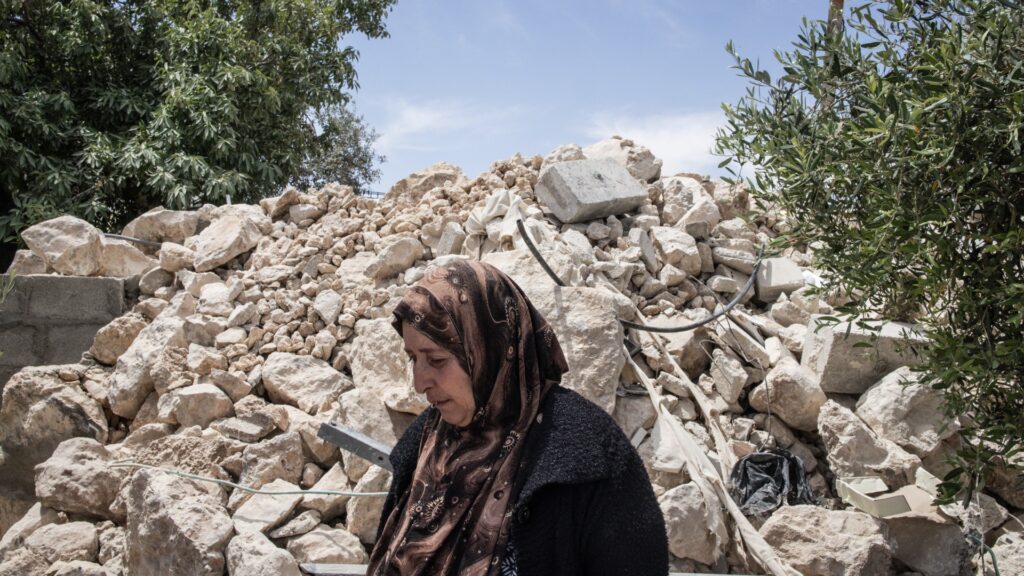One minute to midnight. This is the phrase that kept coming back to me after returning from the occupied Palestinian territories, as I tried to process the overwhelming persecution I had seen there.
What midnight itself looks like – the moment the clock finally strikes – is too bleak to picture fully, though with the haunting horrors of Gaza now etched into the global conscience, many can likely imagine it all too vividly.
A week has passed since that visit. As expected, it stirred little interest in mainstream media circles. So it was something of a relief to see Louis Theroux’s powerful documentary on Israeli settlers ignite a spark of public conversation.
Theroux’s work has drawn criticism. Some say he misrepresented the settler community, even co-opting the term.
I disagree. If anything, “settlers” is far too soft a word. It conjures an image of calm arrival, snowflakes falling gently, or weary travellers gathering around a fire.
New MEE newsletter: Jerusalem Dispatch
Sign up to get the latest insights and analysis on
Israel-Palestine, alongside Turkey Unpacked and other MEE newsletters
But what we witnessed, what Theroux documented, were not settlers. They were occupiers. Colonisers. They were not “settling” – they were unsettling everyone and everything around them.
The phrase “God-given right” is one we often hear, usually metaphorically. But here, in these hills and towns, it takes on its most chillingly literal form.
Storm of injustice
We saw it unfold with our own eyes: armed Israeli settlers openly grazing their livestock on land legally owned by an 82-year-old Palestinian man. With trembling hands and tears in his eyes, he presented his documents, handed down to him by his father, pleading his case to anyone who would listen – but no one in power did.
Around him stood a few disheartened Palestinian onlookers, some Israeli and international human rights activists, myself and the rest of the delegation I was with – observers helpless to intervene in a scene that felt almost performative in its cruelty.
Follow Middle East Eye’s live coverage of the Israel-Palestine war
The settlers stood armed, as so many of them are, emboldened by a state-backed police vehicle idling nearby. Officers watched over them, armed, silent, eerily menacing. The sheep, oblivious, kept grazing.
What we witnessed were not settlers. They were occupiers. Colonisers. They were not ‘settling’ – they were unsettling everyone around them
The injustice lingered in the air like a storm that never breaks. It was a microcosm of the broader reality: the colonisers keep colonising, while the colonised are left in stunned disbelief, and the so-called international rules-based order looks on – at best sheepishly murmuring disapproval, but doing little else.
Israel violates international law with impunity, backed unequivocally by western powers, and the world turns away – unknowing, uncaring, or perhaps both.
This wasn’t a one-off incident. The same story replayed itself again and again, in different settings and with different tones.
In Hebron, we stood outside the home of our Palestinian host as two settlers – with complete confidence and disdain – informed him that they would soon be taking his house.
They demanded that all Arabs leave the land, hurled obscenities at Arabs and the Prophet Muhammad, and spat slurs as they walked away flipping middle fingers – all under the passive watch of Israeli soldiers.
When asked why they had the right to act this way, they simply replied: “God gave us this land,” as though such vitriol was justified in God’s name.
Hurtling towards catastrophe
Then there is Al-Aqsa Mosque, sacred to more than two billion Muslims worldwide – and now visibly under threat. During our visit, which coincided with Passover, the entrances were blocked by Jewish worshippers who danced and sang songs about how they would return to build the Third Temple where Al-Aqsa stands.
Flags depicting the Third Temple flutter across Jerusalem, growing in visibility. Settlers escorted by armed Israeli security forces walk inside Al-Aqsa compound. All the while, Muslim and Christian worshippers are routinely denied entry into their places of worship.

Louis Theroux forces Britain to face uncomfortable truth of Israeli settler barbarism
Read More »
This, too, is part of a trajectory – one that carries dangerous implications. Altering the character of Al-Aqsa threatens the very fabric of religious coexistence in Jerusalem. A local guide described Jerusalem’s religio-cultural blend to me as a “mosaic”, but today a sledgehammer is being taken to this beautiful mosaic, to be replaced by a homogenous slab.
If such provocations continue unchecked, we may be hurtling towards a catastrophe far greater than we dare to admit.
While the world’s eyes are rightly fixed on Gaza and the unfolding genocide there, we cannot ignore what is happening in the occupied West Bank. The dehumanisation of Palestinians there continues, often hidden in bureaucratic terms and sanitised headlines – but it is real, and it is accelerating.
The late Dr Eyad el-Sarraj, founder of the Gaza Community Mental Health Programme, once said that the occupation had left Palestinians “exhausted, tormented and brutalised”. I saw this vividly on the face of a young, widowed mother in Tulkarm, a town now home to new waves of displaced Palestinians.
She clutched her child’s hand tightly, the little girl clinging to her skirt. Her voice barely rose above a whisper when she told me: “You have forgotten us.”
I wanted to deny it. I assured her that we hadn’t; that we remembered her, her daughter, her people. And while that might be true in sentiment, in action, I realised something far harder to say aloud:
No, we have not forgotten them. But yes – we have failed them.
The views expressed in this article belong to the author and do not necessarily reflect the editorial policy of Middle East Eye.


